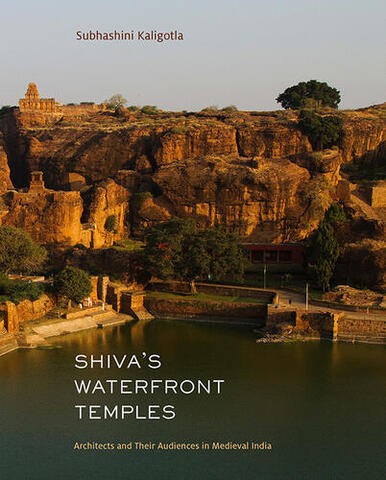A talk by Subhashini Kaligotla (Art History and Archaeology)

Monday, October 24, 2022
A talk by Subhashini Kaligotla (Art History and Archaeology)
On her new book
Shiva’s Waterfront Temples: Architects and their Audiences in Medieval India
Time: 4:15pm - 5:45pm
Location: Room 208 Knox Hall, 606 West 122nd Street, between Broadway and Claremont
Moderated by Isabel Huacuja Alonso (MESAAS)
Discussants: Richard Davis (Bard College) and Pia Brancaccio (Drexel)
Subhashini Kaligotla is the Barbara Stoler Miller Associate Professor of Indian and South Asian Art, in the Columbia Department of Art History and Archaeology. Her areas of expertise extend from the architecture of the early centuries BCE into the first millennium CE. Specific research interests include sacred spaces (Brahmanical, Buddhist, and Jaina); the agency of makers, materials, objects, and spaces; the dialogue between visual and textual representation; and historiography.
She is author of Shiva’s Waterfront Temples: Architects and Their Audiences in Medieval India (2022), a work that places the ingenuity of medieval Deccan Indian makers at its center. The book rethinks the epistemology for the first-millennium temple by drawing attention to the creative resources of architects and the shared aesthetic values and bodily experience of the diverse audiences who moved through medieval spaces.
Her current book project, entitled Seeing Ghosts, is an exploration of the iconographies of death and the afterlife in South Asia and across the Indian Ocean. The project is concerned with mortuary rituals, mourning and memorials, non-terrestrial realms and after-worlds, and various other-worldly beings such as the god of death Yama and bhutas, pretas, and pishachas, that is, manifold ghosts and ghouls. While continuing interests in architecture and sculpture, the research incorporates textiles, painting, painted scrolls, and other media from the subcontinent and the maritime and littoral zones connecting South and Southeast Asia.
Before joining the faculty in Art History and Archaeology, Professor Kaligotla taught at Yale. A practicing poet and author of the poetry collection Bird of the Indian Subcontinent, she publishes poetry in literary journals and anthologies in India, the UK, and the US.
Richard H. Davis is Professor Emeritus and Research Professor of Religion at Bard College. Professor Davis’s primary research and teaching interests include classical and medieval Hinduism, Indian history, South Asian visual arts, and Sanskrit. He is the author of The Bhagavad Gita: A Biography (2014); A Priest’s Guide to the Great Festival: Aghorasiva's Mahotsavavidhi (2009); Lives of Indian Images (1997; winner of the 1999 A. K. Coomaraswamy Prize); and Ritual in an Oscillating Universe: Worshiping Siva in Medieval India (1991). He has edited two volumes, Picturing the Nation: Iconographies of Modern India (2007) and Images, Miracles, and Authority in Asian Religious Traditions (1998), and he wrote the text for a catalog of Indian religious prints, Gods in Print: Masterpieces of India’s Mythological Art (2012). Currently he is continuing work on the reception history of the Bhagavad Gita and on a history of religions in early South Asia.
Pia Brancaccio is Professor in the Department of Art and Art History at Drexel Univeristy where she teaches courses in the arts of South Asia and is responsible for the Asian Art Curriculum. Prior to joining Drexel, she was Research Associate at the Philadelphia Museum of Art and at the Getty Research Institute in Los Angeles, and was a Whitney Fellow at the Metropolitan Museum of Art in New York. Her research focuses on early Buddhist art and cross-cultural exchange in South Asia with a regional emphasis on the visual cultures of ancient Gandhara (Pakistan) and the Deccan Plateau (India). She has published extensively on the Buddhist caves in Western Deccan, including a monograph on The Buddhist Caves at Aurangabad (2010) and the edited volume Living Rock (2013), and has recently expanded her interests to ancient Sri Lanka and the Indian Ocean exchange networks. She has been a longstanding collaborator of the ISMEO-Italian Archaeological Mission in Pakistan, and co-edited the book Gandharan Buddhism: Art, Archaeology (2006).
Isabel Huacuja Alonso is a historian of sound media and modern South Asia, and Assistant Professor in the Department of Middle Eastern, South Asian and African Studies. Her book Radio for the Millions: Hindi-Urdu Broadcasting Across Borders (Columbia University Press, January 2023) is a transnational history of radio broadcasting in Hindi and Urdu from the late colonial period through the early post-independence era (1920-1980). It argues that the medium of radio enabled listeners and broadcasters to contest the cultural, linguistic, and political agendas of the British colonial administration and the subsequent independent Indian and Pakistani governments. The book draws on her dissertation (2015, University of Texas at Austin), which won the Sardar Patel Award for “the best dissertation in any aspect of modern India defended at a US institution.”
